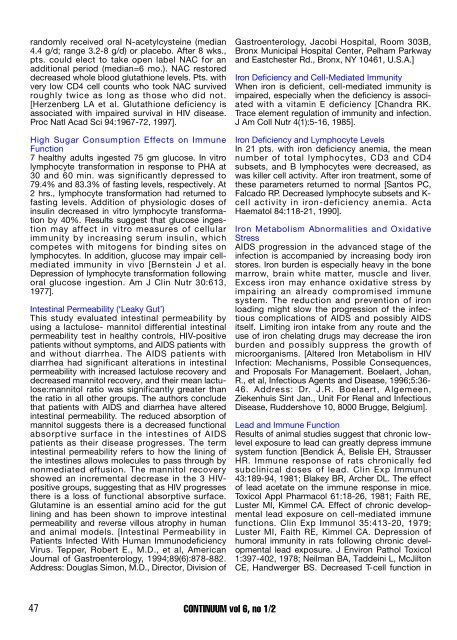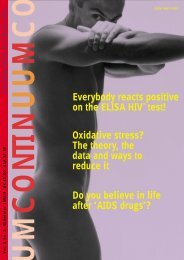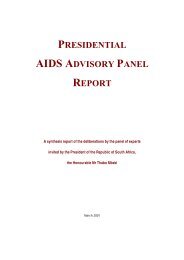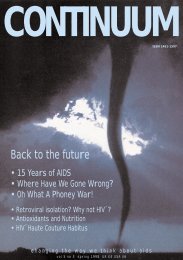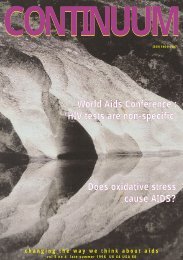AIDS post-HIV : beat of a different drummer - AltHeal
AIDS post-HIV : beat of a different drummer - AltHeal
AIDS post-HIV : beat of a different drummer - AltHeal
You also want an ePaper? Increase the reach of your titles
YUMPU automatically turns print PDFs into web optimized ePapers that Google loves.
andomly received oral N-acetylcysteine (median<br />
4.4 g/d; range 3.2-8 g/d) or placebo. After 8 wks.,<br />
pts. could elect to take open label NAC for an<br />
additional period (median=6 mo.). NAC re s t o re d<br />
decreased whole blood glutathione levels. Pts. with<br />
very low CD4 cell counts who took NAC survived<br />
roughly twice as long as those who did not.<br />
[ H e r z e n b e rg LA et al. Glutathione deficiency is<br />
associated with impaired survival in <strong>HIV</strong> disease.<br />
Proc Natl Acad Sci 94:1967-72, 1997].<br />
High Sugar Consumption Effects on Immune<br />
Function<br />
7 healthy adults ingested 75 gm glucose. In vitro<br />
lymphocyte transformation in response to PHA at<br />
30 and 60 min. was significantly depressed to<br />
79.4% and 83.3% <strong>of</strong> fasting levels, respectively. At<br />
2 hrs., lymphocyte transformation had returned to<br />
fasting levels. Addition <strong>of</strong> physiologic doses <strong>of</strong><br />
insulin decreased in vitro lymphocyte transformation<br />
by 40%. Results suggest that glucose ingestion<br />
may affect in vitro measures <strong>of</strong> cellular<br />
immunity by increasing serum insulin, which<br />
competes with mitogens for binding sites on<br />
lymphocytes. In addition, glucose may impair cellmediated<br />
immunity in vivo [Bernstein J et al.<br />
Depression <strong>of</strong> lymphocyte transformation following<br />
oral glucose ingestion. Am J Clin Nutr 30:613,<br />
1977].<br />
Intestinal Permeability (‘Leaky Gut’)<br />
This study evaluated intestinal permeability by<br />
using a lactulose- mannitol diff e rential intestinal<br />
permeability test in healthy controls, <strong>HIV</strong>- p o s i t i v e<br />
patients without symptoms, and <strong>AIDS</strong> patients with<br />
and without diarrhea. The <strong>AIDS</strong> patients with<br />
diarrhea had significant alterations in intestinal<br />
permeability with increased lactulose recovery and<br />
decreased mannitol recovery, and their mean lactulose:mannitol<br />
ratio was significantly greater than<br />
the ratio in all other groups. The authors conclude<br />
that patients with <strong>AIDS</strong> and diarrhea have altere d<br />
intestinal permeability. The reduced absorption <strong>of</strong><br />
mannitol suggests there is a decreased functional<br />
absorptive surface in the intestines <strong>of</strong> <strong>AIDS</strong><br />
patients as their disease pro g resses. The term<br />
intestinal permeability refers to how the lining <strong>of</strong><br />
the intestines allows molecules to pass through by<br />
nonmediated effusion. The mannitol re c o v e r y<br />
showed an incremental decrease in the 3 <strong>HIV</strong>positive<br />
groups, suggesting that as <strong>HIV</strong> progresses<br />
t h e re is a loss <strong>of</strong> functional absorptive surface.<br />
Glutamine is an essential amino acid for the gut<br />
lining and has been shown to improve intestinal<br />
permeability and reverse villous atrophy in human<br />
and animal models. [Intestinal Permeability in<br />
Patients Infected With Human Immunodeficiency<br />
Virus. Te p p e r, Robert E., M.D., et al, American<br />
J o u rnal <strong>of</strong> Gastro e n t e ro l o g y, 1994;89(6):878-882.<br />
Address: Douglas Simon, M.D., Director, Division <strong>of</strong><br />
G a s t ro e n t e ro l o g y, Jacobi Hospital, Room 303B,<br />
Bronx Municipal Hospital Center, Pelham Parkway<br />
and Eastchester Rd., Bronx, NY 10461, U.S.A.]<br />
Iron Deficiency and Cell-Mediated Immunity<br />
When iron is deficient, cell-mediated immunity is<br />
impaired, especially when the deficiency is associated<br />
with a vitamin E deficiency [Chandra RK.<br />
Trace element regulation <strong>of</strong> immunity and infection.<br />
J Am Coll Nutr 4(1):5-16, 1985].<br />
Iron Deficiency and Lymphocyte Levels<br />
In 21 pts. with iron deficiency anemia, the mean<br />
number <strong>of</strong> total lymphocytes, CD3 and CD4<br />
subsets, and B lymphocytes were decreased, as<br />
was killer cell activity. After iron treatment, some <strong>of</strong><br />
these parameters re t u rned to normal [Santos PC,<br />
Falcado RP. Decreased lymphocyte subsets and K-<br />
cell activity in iron-deficiency anemia. Acta<br />
Haematol 84:118-21, 1990].<br />
I ron Metabolism Abnormalities and Oxidative<br />
Stress<br />
<strong>AIDS</strong> pro g ression in the advanced stage <strong>of</strong> the<br />
infection is accompanied by increasing body iro n<br />
stores. Iron burden is especially heavy in the bone<br />
m a r ro w, brain white matter, muscle and liver.<br />
Excess iron may enhance oxidative stress by<br />
impairing an already compromised immune<br />
system. The reduction and prevention <strong>of</strong> iro n<br />
loading might slow the pro g ression <strong>of</strong> the infectious<br />
complications <strong>of</strong> <strong>AIDS</strong> and possibly <strong>AIDS</strong><br />
itself. Limiting iron intake from any route and the<br />
use <strong>of</strong> iron chelating drugs may decrease the iron<br />
b u rden and possibly suppress the growth <strong>of</strong><br />
m i c ro o rganisms. [Altered Iron Metabolism in <strong>HIV</strong><br />
Infection: Mechanisms, Possible Consequences,<br />
and Proposals For Management. Boelaert, Johan,<br />
R., et al, Infectious Agents and Disease, 1996;5:36-<br />
46. Address: Dr. J.R. Boelaert, Algemeen,<br />
Ziekenhuis Sint Jan., Unit For Renal and Infectious<br />
Disease, Ruddershove 10, 8000 Brugge, Belgium].<br />
Lead and Immune Function<br />
Results <strong>of</strong> animal studies suggest that chronic lowlevel<br />
exposure to lead can greatly depress immune<br />
system function [Bendick A, Belisle EH, Strausser<br />
HR. Immune response <strong>of</strong> rats chronically fed<br />
subclinical doses <strong>of</strong> lead. Clin Exp Immunol<br />
43:189-94, 1981; Blakey BR, Archer DL. The effect<br />
<strong>of</strong> lead acetate on the immune response in mice.<br />
Toxicol Appl Pharmacol 61:18-26, 1981; Faith RE,<br />
Luster MI, Kimmel CA. Effect <strong>of</strong> chronic developmental<br />
lead exposure on cell-mediated immune<br />
functions. Clin Exp Immunol 35:413-20, 1979;<br />
Luster MI, Faith RE, Kimmel CA. Depression <strong>of</strong><br />
humoral immunity in rats following chronic developmental<br />
lead exposure. J Environ Pathol To x i c o l<br />
1:397-402, 1978; Neilman BA, Taddeini L, McJilton<br />
CE, Handwerger BS. Decreased T-cell function in<br />
47<br />
CONTINUUM vol 6, no 1/2


